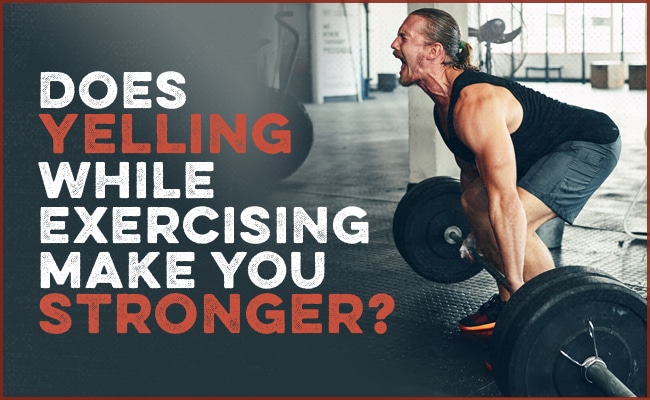
Every gym has that person.
The person who loudly grunts and yells when he’s exercising. This guy is an extreme example of the phenomenon.
While it seems like it’s dudes who are more likely to grunt while working out, women sometimes do it too.
When I was in college at the University of Oklahoma, there was a girl who would grunt with abandon while she sprinted on the treadmill in the student gym. So as you did the elliptical machine while watching VH1’s Tool Academy (the pinnacle of the classical era of reality television), you could hear her carry on, making loud noises that sounded like she was giving birth.
When I’m lifting really heavy, I’ll do some subtle grunting. I don’t do it on purpose. It just sort of happens. Instead of a loud yell, it sounds like I’m straining to release a built-up bowel movement. When I’m doing Bulgarian squats, I’ll let out a fairly loud “AHHHHH!” as the lactic acid accumulates in my quads. It seems to help me finish those last few reps. The operative word here is seems.
After I finished a recent set of yelly Bulgarian squats, I pondered, “Does yelling, moaning, and grunting actually do anything for my lifts? Does it help me hoist heavier weights, or is it just cathartic and/or theatrical?
AoM investigates.
The Science of Grunting, Yelling, and Moaning While Exercising
Believe it or not, scientists have researched this very question.
In 2014, sports scientists Chris Rodolico and Sinclair Smith conducted an experiment involving 30 participants squeezing a handgrip in three ways: just squeezing, squeezing and exhaling, and squeezing while making a vocalization. The researchers found that more force was generated when exhaling compared to just squeezing, but the most significant increase in force (10%) was observed when the subjects vocalized while squeezing.
So yelling and grunting does make people stronger, at least on grip tests.
A similar 2014 study examined whether yelling and grunting helped tennis players hit the ball harder. Thirty-two athletes participated, and stroke velocities and isometric forces were measured while they grunted and while they didn’t. The results indicated that dynamic velocity and isometric force increased nearly 5% when the athletes grunted during both serves and forehand strokes.
This adds more affirmation to the idea that vocalizing while exercising does make you stronger.
But why does it have this effect?
Sinclair Smith hypothesized that yelling could activate the autonomic nervous system, which controls the fight-or-flight response, resulting in an adrenaline rush that helps muscle contractions become more complete and forceful. It’s the same idea behind the research that’s shown that swearing can increase your tolerance to pain.
When availing yourself of the force-generating power of yelling and grunting, you’ll of course need to exercise some discretion, especially when you decide to unleash your barbaric yawp while deadlifting in a public gym. It can be annoying and distracting to some people, so practice good gym etiquette. If you’re in a black iron powerlifting gym where such behavior is expected, then yell with abandon. If you’re in a more sedate, upscale gym where most of the clientele are retirees working the Nautilus machines, rein in your exercise noises. And if you’re in a Planet Fitness, you’ll have to decide if goosing your chances of hitting a bench press PR is worth activating the Lunk Alarm.
The post Does Yelling While Exercising Make You Stronger? appeared first on The Art of Manliness.
0 Commentaires